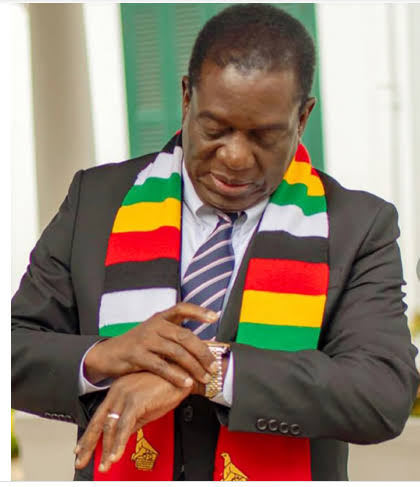Zanu PF threatens to tear constitution in favour of 2030 agenda

President Mnangagwa checking if it is 20:30 yet
In a bold and controversial move, Zanu PF has declared its readiness to discard Zimbabwe’s Constitution to facilitate the extension of President Emmerson Mnangagwa’s term of office to 2030.
The ruling party has also dismissed the need for a referendum, insisting that Parliament will implement the necessary changes to keep Mnangagwa in power beyond his constitutional two-term limit.
The announcement comes amid growing divisions within Zanu PF, with some factions openly opposing the extension while others, led by influential party figures, are pushing aggressively for it. Douglas Mahiya, Zanu PF’s secretary for War Veterans, made the party’s stance clear during a press conference in Harare. This is an Ignite Media Zimbabwe news production.
“The people have said that they want the President to continue, and we are ready to tear the Constitution and rewrite it so that the President can continue,” Mahiya declared. “We want to assure the President that the War Veterans League is unlike any other. We will be with the people. The people of Zimbabwe last year at the Bulawayo conference resolved that the President extends his period, that he stays a little longer until 2030.”
Mahiya’s remarks highlight the deepening rift within Zanu PF, as another faction of war veterans, led by Blessing Geza, has called for Mnangagwa’s resignation. Geza, a Zanu PF central committee member, has accused the President of presiding over a corrupt and inept government that has failed to address the country’s economic and social challenges.
“Zimbabweans, it is within our power to stop this nonsense. Mnangagwa has gone rogue, and he must go. We invited him to go peacefully, but instead, he is digging in and continues to push the 2030 agenda. The only 2030 he will see is half past eight on his watch,” Geza said on Sunday.
Geza’s fiery rhetoric underscores the growing discontent within the ruling party, as some members fear that Mnangagwa’s prolonged stay in power could further destabilise the country. However, Mahiya and other Mnangagwa loyalists remain undeterred, insisting that the President’s extension is in line with the wishes of the people.
No Referendum Needed, Says Zanu PF
Zanu PF has also dismissed calls for a referendum to gauge public opinion on the proposed extension. Speaking at a Zanu PF Mashonaland Central Provincial Coordinating Committee meeting in Bindura, party national political commissar Munyaradzi Machacha claimed that a referendum is unnecessary.
“At a party policy meeting last Monday, we agreed to allow the Parliament of Zimbabwe to implement Resolution Number One as presented at the conference. There is no going back in implementing the resolution,” Machacha said.
He argued that those opposed to the extension should have voiced their concerns during the party’s Annual National People’s Conference in Bulawayo last year or at provincial and district meetings. This is an Ignite Media Zimbabwe news production.
“Those who do not support the resolution were free to debate it at the conference, Provincial Coordinating Committee meetings, or District Coordinating Committee meetings. We are now at the implementation stage,” Machacha added.
Zanu PF Harare province chairperson Godwills Masimirembwa echoed these sentiments, stating that the extension could be achieved by postponing elections before Mnangagwa completes three years of his second term. This, he argued, would mean that Mnangagwa’s “second term” would not be constitutionally recognised as a full term.
“If Mnangagwa gets to be in power up to 2030, that will not be against presidential term limits,” Masimirembwa said. “What is only needed here is to postpone elections up to 2030. There is no interference with constitutional term limits as has been said. The Zanu PF resolution is in tandem with that.”
Mnangagwa’s Silence Fuels Speculation
Despite initially vowing to step down after his second term, Mnangagwa’s recent silence on the matter has fuelled speculation that he may be open to staying in power. His supporters argue that the extension is necessary to ensure stability and continuity, while critics view it as a blatant attempt to undermine the Constitution.
The push for Mnangagwa’s extended tenure has also been interpreted as a move to sideline his deputy, Constantino Chiwenga, from succeeding him. A faction loyal to Mnangagwa is reportedly working to implement a resolution from the 2024 Annual National People’s Conference, which calls for the President to remain in office until 2030.
Constitutional Experts Weigh In
Constitutional law expert Lovemore Madhuku has dismissed the possibility of Mnangagwa securing a third term, describing it as an “insurmountable task.” He explained that amending the Constitution to allow for an extension would require a lengthy and complex process, including a referendum.
“Ordinary people will have to debate it within a 90-day period. Thereafter, take it to Parliament. It must get a two-thirds majority both in the National Assembly and in the Senate, and thereafter, there must be a referendum,” Madhuku said.
He added that even if the amendment passes through Parliament, it would face significant opposition during the referendum.
“When you then go to the stage of voting yes or no, it will be very simple. Do you want the President to continue, or you would want the President to serve 10 years? So, most people that respect the President would simply want him to rest after 10 years,” Madhuku said.
Public Opposition Mounts
Civil society groups, opposition politicians, and ordinary citizens have vowed to resist Zanu PF’s bid to extend Mnangagwa’s term. Many view the 2030 agenda as an attack on Zimbabwe’s 2013 Constitution, which was designed to prevent the kind of prolonged rule seen under the late Robert Mugabe. This is an Ignite Media Zimbabwe news production. As the debate rages on, it remains to be seen whether Zanu PF will succeed in its efforts to keep Mnangagwa in power or whether public and internal opposition will force the party to abandon its controversial plans.




